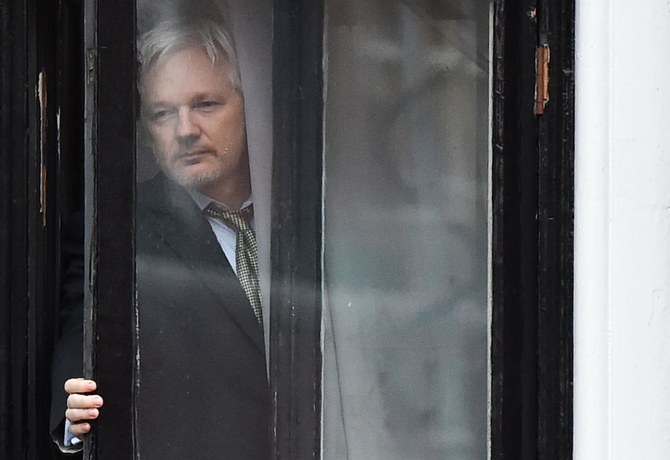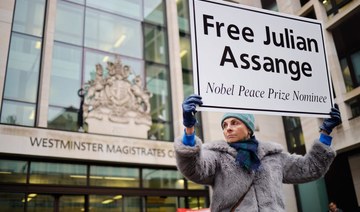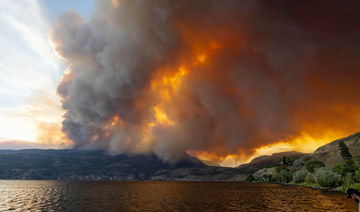LONDON: WikiLeaks founder Julian Assange is set to fight for his freedom in a British court after a decade of legal drama, as he challenges American authorities’ attempt to extradite him on spying charges over the site’s publication of secret US military documents.
Lawyers for Assange and the US government are scheduled to face off in London Monday at an extradition hearing that was delayed by the coronavirus pandemic.
American prosecutors have indicted the 49-year-old Australian on 18 espionage and computer misuse charges adding up to a maximum sentence of 175 years. His lawyers say the prosecution is a politically motivated abuse of power that will stifle press freedom and put journalists at risk.
Assange attorney Jennifer Robinson said the case “is fundamentally about basic human rights and freedom of speech.”
“Journalists and whistle-blowers who reveal illegal activity by companies or governments and war crimes – such as the publications Julian has been charged for – should be protected from prosecution,” she said.
American prosecutors say Assange is a criminal, not a free-speech hero.
They allege that Assange conspired with US army intelligence analyst Chelsea Manning to hack into a Pentagon computer and release hundreds of thousands of secret diplomatic cables and military files on the wars in Iraq and Afghanistan. They also say he conspired with members of hacking organizations and sought to recruit hackers to provide WikiLeaks with classified information.
“By disseminating the materials in an unredacted form, he likely put people — human rights activists, journalists, advocates, religious leaders, dissidents and their families — at risk of serious harm, torture or even death,” James Lewis, a British lawyer acting for the US government, told a hearing in February.
Assange argues he is a journalist entitled to First Amendment protection, and says the leaked documents exposed US military wrongdoing. Among the files released by WikiLeaks was video of a 2007 Apache helicopter attack by American forces in Baghdad that killed 11 people, including two Reuters journalists.
His lawyers argue the prosecution is an abuse of process by a Trump administration that wants to make an example of Assange. They say he would be held in inhuman conditions and would not get a fair trial in the United States.
Journalism organizations and human rights groups have called on Britain to refuse the extradition request. Amnesty International said Assange was “the target of a negative public campaign by US officials at the highest levels.”
“If Julian Assange is prosecuted it could have a chilling effect on media freedom, leading publishers and journalists to self-censor in fear of retaliation,” said Amnesty’s Europe Director, Nils Muižnieks.
The four-week extradition hearing is part of a twisting saga rife with competing claims of hacking, spying and subterfuge. Assange’s lawyers claim the US intelligence services directed a private security firm to spy on him while he was living in Ecuador’s London embassy — a case currently being heard in a Spanish court.
Assange also alleges he was offered a pardon by the Trump administration if he agreed to say Russia wasn’t involved in leaking Democratic National Committee emails that were published by WikiLeaks during the 2016 US election campaign. The White House denies that claim.
Assange’s legal troubles began in 2010, when he was arrested in London at the request of Sweden, which wanted to question him about allegations of rape and sexual assault made by two women. He refused to go to Stockholm, saying he feared extradition or illegal rendition to the United States or the US prison camp at Guantanamo Bay, Cuba.
In 2012, Assange sought refuge inside the Ecuadorian Embassy, where he was beyond the reach of UK and Swedish authorities — but also effectively a prisoner, unable to leave the tiny diplomatic mission in London’s tony Knightsbridge area.
The relationship between Assange and his hosts eventually soured, and he was evicted from the embassy in April 2019. British police immediately arrested him for jumping bail in 2012.
Sweden dropped the sex crimes investigations in November 2019 because so much time had elapsed, but Assange remains in London’s high-security Belmarsh Prison as he awaits the extradition decision. Supporters say the ordeal has harmed Assange’s physical and mental health, leaving him with depression, dental problems and a serious shoulder ailment.
Assange’s partner Stella Moris, who had two sons with him while he lived in the embassy, said he looked thinner and was in “a lot of pain” when she visited him in prison in late August for the first time since March.
The extradition hearing opened in February but was put on hold when the UK went into lockdown in March to slow the spread of the coronavirus. It is resuming with social distancing measures in court and video feeds so that journalists and observers can watch remotely.
Assange is expected to be brought by prison van from Belmarsh to the Old Bailey criminal court for the hearing, which is due to run until early October. District Judge Vanessa Baraitser is likely to take weeks or even months to consider her verdict, with the losing side likely to appeal.
WikiLeaks’ Assange to fight US extradition bid in UK court
https://arab.news/4cwfw
WikiLeaks’ Assange to fight US extradition bid in UK court

- American prosecutors have indicted the 49-year-old Australian on 18 espionage and computer misuse charges adding up to a maximum sentence of 175 years
- His lawyers say the prosecution is a politically motivated abuse of power that will stifle press freedom and put journalists at risk
Two Americans, one Russian citizen among 20 detained in Georgia, Russia’s TASS reports
- 20 people detained at protests in Tbilisi while Georgian lawmakers were debating a “foreign agents” bill
Russia downs 16 Ukraine-launched missiles, 31 drones

- Russian defense ministry: 12 guided missiles were launched from a Ukrainian Vilkha multiple rocket launcher
- Four Storm Shadow aircraft guided missiles and seven drones were downed over Crimea
The Russian defense ministry said on Monday its air defense systems destroyed 16 missiles and 31 drones that Ukraine launched at Russian territory overnight, including 12 missiles over the battered border region of Belgorod.
Five houses were damaged in Belgorod, but according to preliminary information, there were no injuries, Governor Vyacheslav Gladkov wrote on the Telegram messaging app.
On Sunday, 15 people were killed in Belgorod when a section of an apartment block collapsed after being struck by fragments of a Soviet-era missile, launched by Ukraine and shot down by Russian forces, Russia said.
The Russian defense ministry said on Monday the 12 guided missiles were launched from a Ukrainian Vilkha multiple rocket launcher.
The ministry also said four Storm Shadow aircraft guided missiles and seven drones were downed over Crimea, eight drones were destroyed over the Kursk region and four were intercepted over the Lipetsk region.
A drone sparked a short-lived fire at an electrical substation in the Kursk region, Igor Artamonov, the governor of the region in Russia’s south, wrote on Telegram.
“There are no casualties. The fire in the territory of the electrical substation is being extinguished,” Artamonov said.
Reuters could not independently verify the reports.
There was no immediate comment from Ukraine. Kyiv says that targeting Russia’s military, transport and energy infrastructure undermines Moscow’s war effort and is an answer to the countless deadly attacks by Russia.
Western Canada blazes cause evacuations, air quality concerns

- Authorities issued an evacuation order for a community in British Columbia and warn of poor air quality across provinces
TORONTO: The season’s first major wildfires have spread to roughly 10,000 hectares across Western Canada on Sunday as authorities issued an evacuation order for a community in British Columbia and warned of poor air quality across provinces.
In British Columbia, thousands of residents in Northern Rockies Regional Municipality and Fort Nelson First Nations were evacuated as the nearby blaze nearly doubled to 4,136 hectares.
Northern Rockies Regional Municipality Mayor Rob Fraser in a TV interview said most of the 3,500 residents in and around Fort Nelson had been evacuated.
Fort Nelson First Nation, seven kilometers from the town, also issued an evacuation order for Fontas, an Indigenous community.
Across the border in Alberta, residents of Fort McMurray, an oil hub which suffered extensive damage from wildfires in 2016, were asked to prepare to leave.
However, by the end of the day, favorable weather helped by a shower forecast tamed fire growth at Fort McMurray. Authorities said they expected fire activity to remain low with more showers expected on Monday.
Alberta continued to stress the two wildfires were extreme and out of control and recorded 43 active fires, including one located 16km southwest of Fort McMurray. By Sunday, authorities revised the area affected by fire to 6,579 hectares, much larger than what was reported on Friday.
Fraser said the fire was started by a tree blown down by strong winds falling onto a power line.
Six crews of wildland firefighters, 13 helicopters and airtankers were taming the fire on Sunday, said Alberta authorities.
Evacuation alerts were in place for Fort McMurray, Saprae Creek Estates and expanded to Gregoire Lake Estates and Rickards Landing Industrial Park.
Although there is no immediate risk to these communities, the alert ensures residents are prepared to evacuate if conditions change.
Smoke in Fort McMurray on Saturday was coming from fires in northern British Columbia, Alberta said.
Environment Canada issued a special air quality statement that extends from British Columbia to Ontario on Sunday.
Last year, a veil of smoke blanketed the US East Coast, tinging the skies a fluorescent orange as smoke reached parts of Europe as hundreds of forest fires burnt millions of acres of land and forced about 120,000 people to leave their homes.
The federal government has warned Canada faces another “catastrophic” wildfire season as it forecast higher-than-normal spring and summer temperatures across much of the country, boosted by El Nino weather conditions.
Canada experienced one of its warmest winters with low to non-existent snow in many areas, raising fears ahead of a hot summer triggering blazes in forests and wildlands amid an ongoing drought.
India to sign 10-year pact with Iran for Chabahar port management— report

- India has been developing port to transport goods to Iran, Afghanistan and Central Asia to avoid Karachi
- Sanctions imposed by Washington on Iran have slowed down Chabahar port’s development work
NEW DELHI: India is likely to sign an agreement with Iran on Monday to manage the southeastern Iranian port of Chabahar for the next 10 years, the Economic Times reported.
India Shipping Minister Sarbananda Sonowal is likely to travel to Iran to sign the agreement, the report said, citing unidentified sources.
The Indian government did not immediately respond to a request for comment.
India has been developing a part of the port in Chabahar, which is located on Iran’s southeastern coast along the Gulf of Oman, as a way to transport goods to Iran, Afghanistan and central Asian countries that avoids the port of Karachi in its rival Pakistan.
US sanctions on Iran, however, have slowed down the port’s development.
India vote to resume with Kashmir poised to oppose Modi

- Jammu and Kashmir has deeply resented Modi government’s 2019 snap decision to bring territory under its control
- Rebel groups opposed to Indian rule have waged an insurgency since 1989 on frontier controlled by New Delhi
SRINAGAR, India: India’s six-week election is set to resume Monday including in Kashmir, where voters are expected to show their discontent with dramatic changes in the disputed territory under Prime Minister Narendra Modi’s government.
Modi remains popular across much of India and his Hindu-nationalist Bharatiya Janata Party (BJP) is widely expected to win the poll when it concludes early next month.
But his government’s snap decision in 2019 to bring Kashmir under direct rule by New Delhi — and the drastic security clampdown that accompanied it — have been deeply resented among the region’s residents, who will be voting for the first time since the move.
“What we’re telling voters now is that you have to make your voice heard,” said former chief minister Omar Abdullah, whose National Conference party is campaigning for the restoration of Kashmir’s former semi-autonomy.
“The point of view that we want people to send out is that what happened... is not acceptable to them,” he told AFP.
Kashmir has been divided between India and Pakistan since their independence in 1947. Both claim it in full and have fought two wars over control of the Himalayan region.
Rebel groups opposed to Indian rule have waged an insurgency since 1989 on the side of the frontier controlled by New Delhi, demanding either independence or a merger with Pakistan.
The conflict has killed tens of thousands of soldiers, rebels and civilians in the decades since, including a spate of firefights between suspected rebels and security forces in the past month.
Violence has dwindled since the Indian portion of the territory was brought under direct rule five years ago, a move that saw the mass arrest of local political leaders and a months-long telecommunications blackout to forestall expected protests.
Modi’s government says its canceling of Kashmir’s special status has brought “peace and development,” and it has consistently claimed the move was supported by Kashmiris.
But his party has not fielded any candidates in the Kashmir valley for the first time since 1996, and experts say the BJP would have been roundly defeated if it had.
“They would lose, simple as that,” political analyst and historian Sidiq Wahid told AFP last week.
The BJP has appealed to voters to instead support smaller and newly created parties that have publicly aligned with Modi’s policies.
But voters are expected to back one of two established Kashmiri political parties calling for the Modi government’s changes to be reversed.
India’s election is conducted in seven phases over six weeks to ease the immense logistical burden of staging the democratic exercise in the world’s most populous country.
More than 968 million people are eligible to vote in India’s election, with the final round of polling on June 1 and results expected three days later.
Turnout so far has declined significantly from the last national poll in 2019, according to election commission figures.
Analysts have blamed widespread expectations that Modi will easily win a third term and hotter-than-average temperatures heading into the summer.
India’s weather bureau has forecast more hot spells in May and the election commission formed a taskforce last month to review the impact of heat and humidity before each round of voting.
















